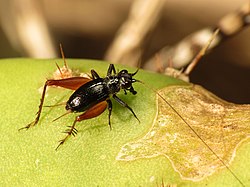| Trigonidiinae | |
|---|---|
 | |
| Trigonidium cicindeloides male | |
| Scientific classification | |
| Kingdom: | Animalia |
| Phylum: | Arthropoda |
| Class: | Insecta |
| Order: | Orthoptera |
| Suborder: | Ensifera |
| Family: | Trigonidiidae |
| Subfamily: | Trigonidiinae Saussure, 1870 |
| Diversity | |
| >40 genera. See text. | |
Trigonidiinae is a subfamily of insects in the order Orthoptera, suborder Ensifera, based on the type genus Trigonidium . They are often referred to as sword-tail crickets, [1] winged bush crickets or trigs. [2]
